tense revision
初中九年级(初三)英语课件 一般过去时和现在完成时的区别
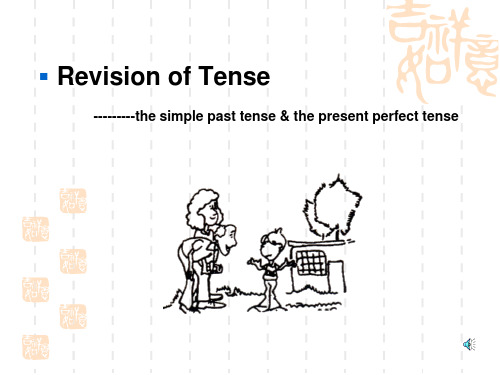
6. Help yourself , please. No, thanks. I’m full. I __h_a_v_ejujsuts_t _e_a_te_nthree eggs.(eat)
already yet
never
just
ever
before these days
in the past ten yesrs...
Right or wrong?
for last year since one day for ten days ago Since he comes here. since in 1990
come borrow leave go join die become buy begin get to know fall asleep… (非持续性动词)
Use the right form of “go to” to finish this dialogue:
A: Were’s Mr Green? B: He _h_a_s_g_o_n_e__to__Beijing. A: When did he go there? B: He _w__e_n_t _ there a week ago. A: ___H_a_s__ he ever __b_ee_n__to_ Beijjing before? B: Yes, he __h_a_s__b_e_e_n__ there twice. A: When will he come back? B: Sorry, I don’t know. He __h_a_s_b_e_e_n__inBeijing for a week.
小学五年级英语 Unit 4 Revision The Simple Past Tense 教学设计
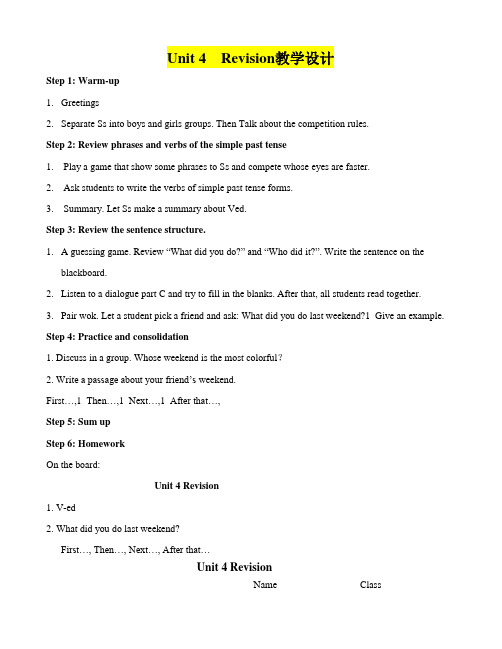
Unit 4 Revision教学设计Step 1: Warm-up1.Greetings2.Separate Ss into boys and girls groups. Then Talk about the competition rules.Step 2: Review phrases and verbs of the simple past tense1. Play a game that show some phrases to Ss and compete whose eyes are faster.2. Ask students to write the verbs of simple past tense forms.3. Summary. Let Ss make a summary about Ved.Step 3: Review the sentence structure.1. A guessing game. Review “What did you do?”and “Who did it?”. Write the sentence on theblackboard.2.Listen to a dialogue part C and try to fill in the blanks. After that, all students read together.3.Pair wok. Let a student pick a friend and ask: What did you do last weekend?1 Give an example. Step 4: Practice and consolidation1. Discuss in a group. Whose weekend is the most colorful?2. Writ e a passage about your friend’s weekend.First…,1 Then…,1 Next…,1 After that…,Step 5: Sum upStep 6: HomeworkOn the board:Unit 4 Revision1. V-ed2. What did you do last weekend?First…, Then…, Next…, After that…Unit 4 RevisionName ______________Class ______________一.比一比,看谁写得又快又正确.1.写出下列规则动词的过去式:(1) (2)look ________ carry ________live ________ stop ________close ________ walk ________play _________ return ________2.Irregular verb 不规则动词(3) (4)am/is _______ read _______are _______ fly ________see _______ go ________do ______ swim _________二.听录音,看图填空Mr. Li : Hello, Hannah!What ______________________ this morning?Hannah: First, I __________________________.Then I __________________________. I ____________________________________too.After that, I ________________________________.Finally I ___________________________________.Now I’m talking to you.三.writingHappy Weekend________’s Weekend is the most colourful.First, _________________________________________________________________________, _______________________________________________________________________,____________________________________________________________________________, ______________________________________________________________________________________________________________________________________________________________________________________________________________。
6B Chapter 4 Coping with problems 课件(新思维小学英语)

Activity 1
Mrs Pang Mr Wong
Joe’s cat died. Mrs Pang died.
‘You’ll feel better after a while.’
‘So will I.’ (=I’ll miss Mrs Pang a lot too.)
Answers
Activity 2
Activity 3
Activity 4
Time heals everything.
You should study harder.
You should do something to relax.
…
stressed about exams
oCLfJeoatMJhtMnoe’ersesrytplsapooaPlrrPukooaoleoaknbgbdntglaulegewatemhmbisssteassohosl.ipmudwtheht?hie.dsaatt
It’s OK. You can call and talk to him often.
…
best friend is changing school
You should do something to make up with her.
You should take it easy.
When one door closes, another one opens.
e.g. I have lost my purse. (I don’t have my purse with me anymore. I’m upset.)
Future tense - revision
We can use the future tense to express promises or future plans (e.g. things that we can do to cope with problems).
正在进行时复习课课件
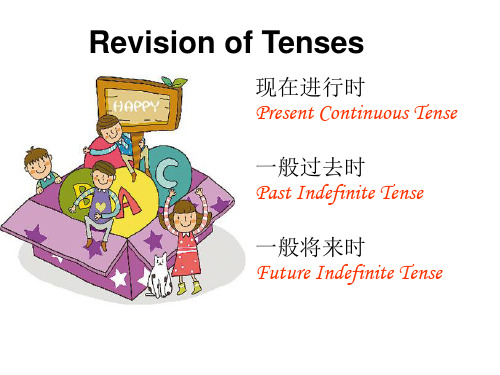
run- running swim- swimming ________ sit- _________ sitting shop-_________ shopping
1、一般情况下直接在动词原形后加ing。
2、末尾是不发音的e结尾的动词要去e加ing。 3、部分动词需双写末尾再加ing。如,run-running。
Revision of Tenses
现在进行时 Present Continuous Tense 一般过去时 Past Indefinite Tense 一般将来时 Future Indefinite Tense
Revision of Tenses
• 现在进行时 • Present Continuous Tense
doing the dishes/… going fishing/… washing the clothes/… playing the piano/… writing a plan/… taking pictures anweringthe phone
write
taking take answer answering
Dialogue showing
Panda is doing Kungfu now. Can you discribe ?
It’s a sunny day, Panda gets to a nature park….
Imagine that you were in a nature park. What are you doing? (请写下来并phone call to Tiger!
Listen and fill in the blanks T: Hello! P: Hi. ______Panda. What are you doing?
Revision_--Present_perfect_tense(现在完成时态)
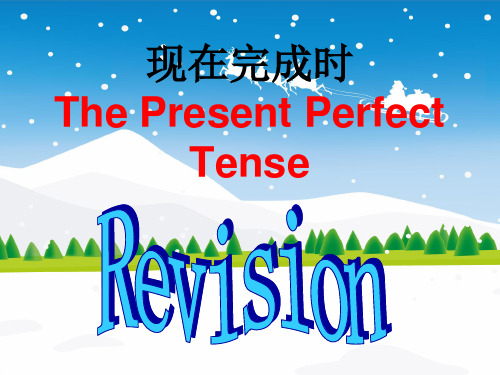
The old man has died for ten years. F The old man has been dead for ten years/since 10 years ago. T The old man died 10 years ago. T
1.A: I ________(lose) my pen. Can you lend A have lost me yours? B: Why don't you buy one? A: It _______(fall) into the river only a fell moment ago when I washed my hands. Now I've got to fill in a form with a pen. 2. A: --When did you lose your cat? B: --I __________(lose) it last night. lost A: --Where did you find it? B: --I __________(find) it the garden. found
I. 分清一般过去时与现在完成时Tell the differences I cleaned the blackboard half an hour ago(只说 ( 和其发生的时间) 明“擦”和其发生的时间 I have cleaned the blackboard. (说明现在黑板 是干净的) 是干净的) The teacher has written some new words on the blackboard(黑板上现在有单词) (黑板上现在有单词) The teacher wrote some new words on the blackboard just now.(可能黑板上现在没有单 ( 词) 总结:( )一般过去时只表示过去的动作或状态, 总结 (1)一般过去时只表示过去的动作或状态 和现在不发生关系。 强调动作发生的时间 强调动作发生的时间) 和现在不发生关系。(强调动作发生的时间 现在完成时表示过去发生的某一动作 对现在造 成的影响,强调的是现在。(侧重动作的结果 成的影响 强调的是现在。 侧重动作的结果) 强调的是现在 侧重动作的结果
tense的名词解释
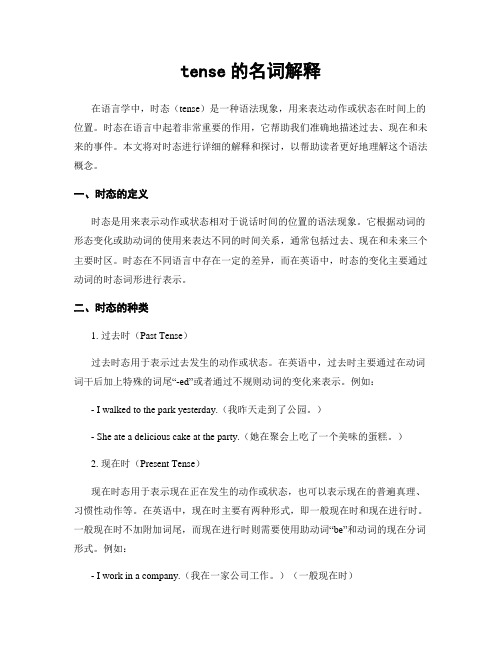
tense的名词解释在语言学中,时态(tense)是一种语法现象,用来表达动作或状态在时间上的位置。
时态在语言中起着非常重要的作用,它帮助我们准确地描述过去、现在和未来的事件。
本文将对时态进行详细的解释和探讨,以帮助读者更好地理解这个语法概念。
一、时态的定义时态是用来表示动作或状态相对于说话时间的位置的语法现象。
它根据动词的形态变化或助动词的使用来表达不同的时间关系,通常包括过去、现在和未来三个主要时区。
时态在不同语言中存在一定的差异,而在英语中,时态的变化主要通过动词的时态词形进行表示。
二、时态的种类1. 过去时(Past Tense)过去时态用于表示过去发生的动作或状态。
在英语中,过去时主要通过在动词词干后加上特殊的词尾“-ed”或者通过不规则动词的变化来表示。
例如:- I walked to the park yesterday.(我昨天走到了公园。
)- She ate a delicious cake at the party.(她在聚会上吃了一个美味的蛋糕。
)2. 现在时(Present Tense)现在时态用于表示现在正在发生的动作或状态,也可以表示现在的普遍真理、习惯性动作等。
在英语中,现在时主要有两种形式,即一般现在时和现在进行时。
一般现在时不加附加词尾,而现在进行时则需要使用助动词“be”和动词的现在分词形式。
例如:- I work in a company.(我在一家公司工作。
)(一般现在时)- She is reading a book.(她正在读一本书。
)(现在进行时)3. 将来时(Future Tense)将来时态用于表示将来发生的动作或状态。
在英语中,将来时通常使用助动词“will”或“be going to”来与动词原形搭配使用。
例如:- I will call you tomorrow.(我明天会打电话给你。
)- We are going to visit our grandparents next week.(我们下周要去看望我们的祖父母。
一般将来时和一般过去时
----I’m going to see a film. You will be forty years old next year. Tomorrow will be Sunday again.
2. be going to+动词原形可表示事先计划的意图,而 will 则表示说话人当时决定的意图; We're going to drive you home after the meeting. Don't call a taxi. We'll drive you home. I feel ill now, and I'll go to see the doctor. I'm going to see the doctor this evening. He is studying hard and is going to try for the exams. 他 正努力学习,准备参加考试。(不能用will替换) —Can somebody help me? ——谁能帮我一下吗? —I will. ——我来。(不能用be going to替换)
What Why
will they do in Ningbo? will he come here?
---- Why will you be here on Sunday? ---- I’ll have a meeting on Sunday. 对特殊疑问句要进行具体回答。
一般将来时的主要用法: 一般将来时的主要用法:
三、be about to 结构表示将来
表示即将要发生的动作. Hurry up! We're about to leave. The football match is about to begin in a few minutes.
revision翻译术语
revision翻译术语Revision(修订/复习)是指对一篇文章、文档或其他形式的作品进行修改和改进的过程。
它可以包括对内容、结构、语法、拼写等方面的检查和修正。
以下是一些与revision相关的术语及其用法和中英文对照例句。
1. Proofreading(校对):检查文档中的拼写、语法和标点错误,并进行修正。
- Could you please proofread my essay before I submit it?(在我提交之前,你能帮我校对一下我的文章吗?)2. Editing(编辑):对文档的结构、内容和语言进行修改和改进,以提高其可读性和准确性。
- The editor suggested some changes to improve the flow of the article.(编辑建议对文章进行一些修改,以改善其连贯性。
)3. Rewriting(重写):对文档进行彻底的修改和改写,以改善其结构、风格和内容。
- The writer had to rewrite the entire chapter to make it more engaging for the readers.(作者不得不重写整章内容,以使其更吸引读者。
)4. Peer review(同行评审):通过同行的审查和意见反馈,对文章或研究进行评估和改进。
- The research paper went through a rigorous peer review process before it was accepted for publication.(这篇研究论文在被接受发表之前经过了严格的同行评审过程。
)5. Track changes(修订痕迹):在文档中显示出进行的修改和改动,以便作者或编辑能够清楚地看到每一处变动。
- The editor used the "track changes" feature in Microsoft Word to provide feedback on the document.(编辑使用了Microsoft Word中的"修订痕迹"功能,对文档进行反馈。
七年级上册英语四单元笔记
七年级上册英语四单元笔记Unit 4: RevisionIn this unit, we will revise the topics covered in the seventh-grade English textbook. We will discuss grammar rules, vocabulary words, and practice exercises. Let's dive into the Unit 4 revision!1. Grammar1.1 Present Simple Tense- Used to talk about habitual actions or routines.- Structure: Subject + verb (base form) + object.- Examples: She eats apples every day. They go to school by bus.1.2 Present Continuous Tense- Used to talk about actions happening at the moment of speaking.- Structure: Subject + be verb (am/is/are) + verb (-ing form) + object.- Examples: He is playing soccer right now. They are studying for the test.1.3 Past Simple Tense- Used to talk about completed actions in the past.- Structure: Subject + past tense of the verb + object.- Examples: She watched a movie yesterday. We played video games last night.2. Vocabulary2.1 Food and Drinks- apple, banana, orange, carrot, milk, water, juice, pizza, hamburger, sandwich- Example sentence: I like to eat apples and drink orange juice.2.2 Places and Prepositions- library, park, supermarket, cinema, hospital, beside, between, in front of, behind- Example sentence: The library is behind the supermarket.2.3 Free Time Activities- read, watch TV, listen to music, play sports, swim, dance, draw, play the guitar- Example sentence: She enjoys reading books and playing the guitar in her free time.3. Practice Exercises3.1 Multiple Choice QuestionsChoose the correct answer.1. What ___ you doing? (are/is/am)2. He ___ to the park yesterday. (go/went/goes)3. My sister ___ fruits and vegetables. (like/likes/liking)3.2 Fill in the BlanksComplete the sentences with the appropriate word.1. The hospital is ___ the library and the supermarket.2. I enjoy ___ books and playing sports.3. They ___ watching a movie last night.3.3 Writing TaskWrite a short paragraph about your daily routine using the present simple tense. Include at least three activities you do regularly.Example:I wake up at 6 o'clock every morning. After brushing my teeth, I have breakfast with my family. Then, I go to school by bus. In the afternoon, I do my homework and study for my exams. In the evening, I have dinner and spend time with my friends. Finally, I go to bed at around 10 o'clock.4. ConclusionIn this Unit 4 revision, we reviewed important grammar rules, expanded our vocabulary, and practiced various exercises. It is essential to reinforce these concepts to enhance our English language skills. Remember to apply these lessons in your daily conversations and written tasks to improve fluency. Keep up the good work and continue exploring new learning opportunities. Good luck!。
现在进行时
I: What are you doing(going to do) on Tuseday? L: I plan to visit my grandmother with my mum. I:How about Friday? L:I will be free. I:Well, let's meet on Friday.I know you're found of dancing, so I'm taking(I'm going to take) you to a dance party. L:Oh,thank you.I'd love to go.See you then. I:See you!
时间状语: 时间状语:these days, today, this week, this term…
3. 表示反复性或习惯性的动作,常与 表示反复性或习惯性的动作,常与always, continually等连用,表示说话人的赞扬、厌恶、 等连用,表示说话人的赞扬、厌恶、 等连用 不满和遗憾等感情色彩。 不满和遗憾等感情色彩。
Revision:
6.她改变了去日本的主意了(change one's mind) 她改变了去日本的主意了( 她改变了去日本的主意了 ) She changed her mind to Japan. 7.玛丽已经下定决心出国留学了。(make up 玛丽已经下定决心出国留学了。 玛丽已经下定决心出国留学了 one's mind) ) Mary has made up her mind to study abroad.
Revision:
3.她虽然有很多缺点,但是我们都很喜欢她。 她虽然有很多缺点,但是我们都很喜欢她。 她虽然有很多缺点 (be fond of) ) She has many shortcomings, but we are all fond of her. 4.玛丽坚持要求我们做公共汽车去那里。(insist) 玛丽坚持要求我们做公共汽车去那里。 玛丽坚持要求我们做公共汽车去那里 ) Mary insisted that we (should) go there by bus. 5.他唯一在乎的东西就是钱。(care about) 他唯一在乎的东西就是钱。 他唯一在乎的东西就是钱 ) The only thing he cares about is money.
- 1、下载文档前请自行甄别文档内容的完整性,平台不提供额外的编辑、内容补充、找答案等附加服务。
- 2、"仅部分预览"的文档,不可在线预览部分如存在完整性等问题,可反馈申请退款(可完整预览的文档不适用该条件!)。
- 3、如文档侵犯您的权益,请联系客服反馈,我们会尽快为您处理(人工客服工作时间:9:00-18:30)。
T ense Question
Present tense
Do you drink milk? -----------you----------(play) with me?
No,i don't. Yes,---------------------------------------------- Does he eat egg? -----------she----------(see) a dog?
Yes,he do. No,-----------------------------------------------------Present continues tense
Is he eating egg? -----------she----------(buy) food ?
yes,he is. yes,----------------------------------------------- Are you ok? ------------they---------(have) a pet?
No,i am not. No,----------------------------------------------- Am i a girl? ------------i--------------(do) homework? Yes,you are. Yes,----------------------------------------------Future Tense
Will i have a lunch? ----------she-----------(come) tomorrow? Yes,You will. No,she---------------------------------.
No you won't
Past tense
Did you come yesterday? ---------she--------(write) to you?
no,i didn't. Yes,-----------------------------
Yes, i did.
Present Perfect Tense
Have you done your homework?--------you--------(see)a girl?
No,I haven't. Yes,i----------------------
Has she gone tonight? -----------he---------(meet)you? Yes,she has. No,-------------------------------
Tense Revision
∙I ------------(do) homework everyday.
∙He -----------(play) games every night.
∙She---------------(listen) to music now.
∙I --------------(finish) my job tomorrow.
∙I---------------(not do) my project yet.
∙I-------------(go) to the park yesterday. Present Tense
he/she/it -----Verb+ies/es/s
time word:everyday usually always every night
Past Tense
verb change to past form:do=did
time word:yesterday last day long time ago
Future Tense
will+verb(no need change)
time word:tomorrow
Present Continues Tense
is am are + verb+ing=he is doing housework.
time work:now at present at the moment
Present Perfect Tense
have/has +perfect form:have gone
time word:already yet just。
